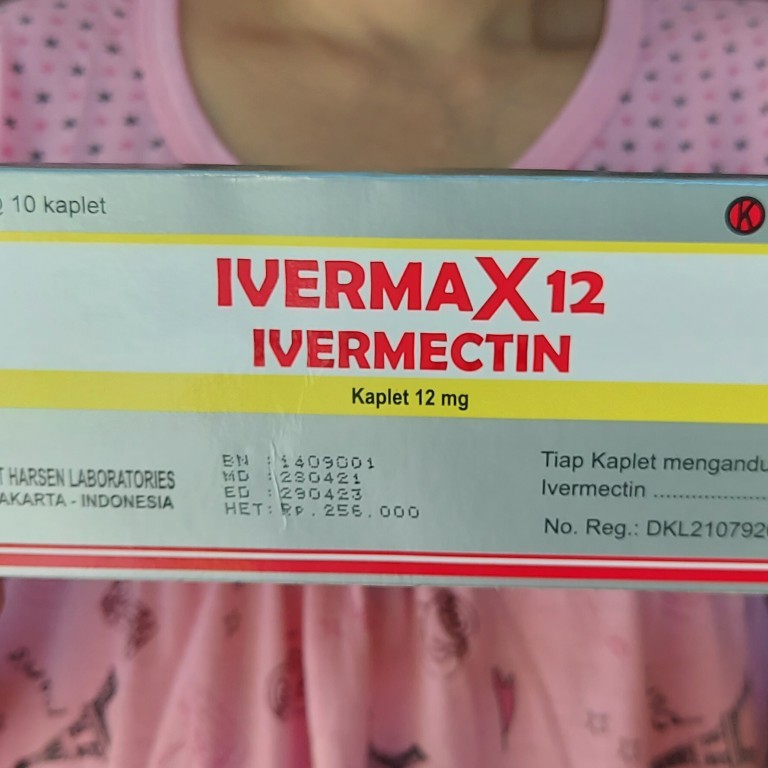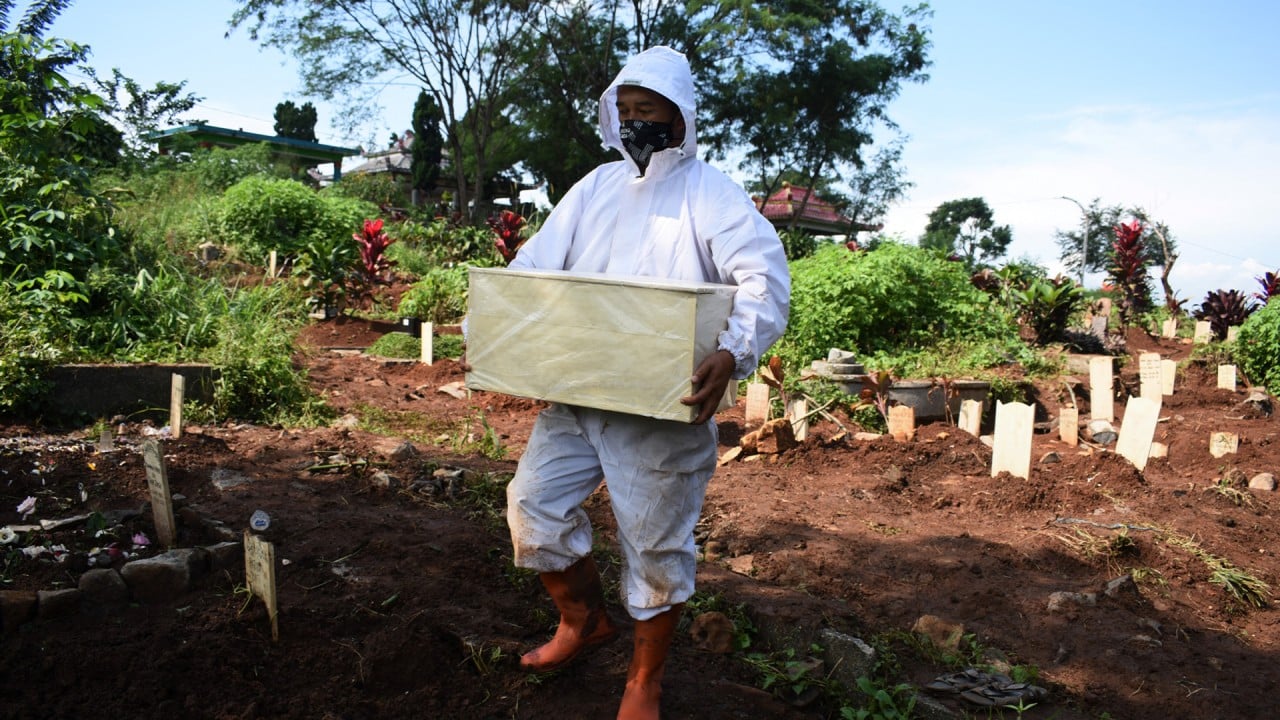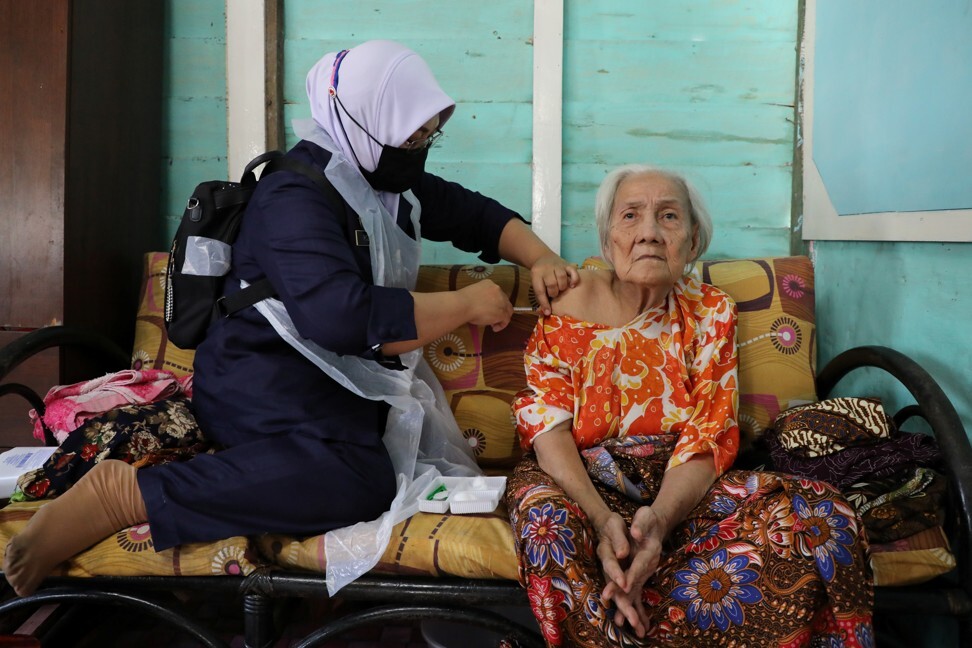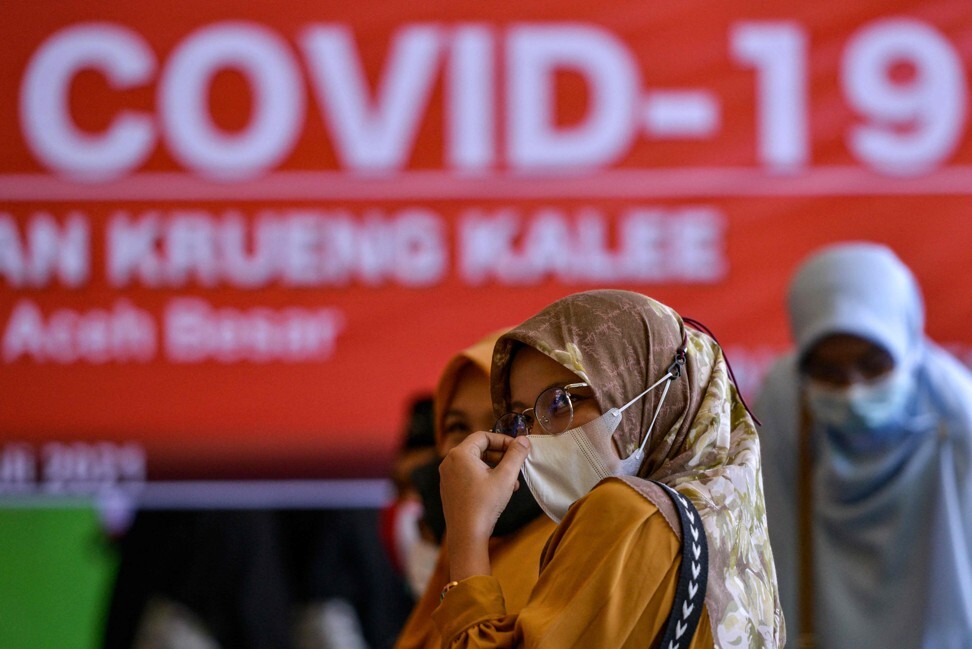
Coronavirus: anti-parasitic drug ivermectin is hot property in Indonesia, Malaysia, India as Delta variant spreads
- Some officials and independent medical groups have hailed it as a ‘miracle cure’ amid rising infections and low vaccination rates in the region
- This is even as the WHO says evidence on the use of the deworming drug to treat Covid-19 patients is ‘inconclusive’
Pharmacies across the country are reporting a boom in sales of the medication, and it has been sold out on e-commerce sites such as Bukalapak and Shopee. “People have been flocking to buy it,” said a pharmacist at Penang Island Pharmacy in the city of Medan in North Sumatra, who did not want to be named.
Anti-vaccine disinformation undermining Southeast Asia’s virus response
Moeldoko, Indonesia’s Presidential Chief of Staff, on Monday said while ivermectin was traditionally used to treat parasites such as worms, the pandemic had now reached a critical phase.
The Southeast Asian country has the highest number of Covid-19 cases in the region, recording over 2.1 million infections and more than 58,000 deaths. On Wednesday, it reported its biggest daily jump of 21,807 infections.
“Looking at the data we have available, we are quite optimistic that ivermectin can be an effective drug solution to cure Covid patients,” Moeldoko said, claiming it had been effectively used in 15 other countries to treat the virus.

02:41
Indonesia hits record daily Covid-19 caseload as total infections pass 2 million
Susi Pudjiastuti, the widely popular former maritime and fisheries minister, has also praised the drug. In a video uploaded on Twitter on Wednesday, Pudjiastuti said she had taken ivermectin with paracetamol and vitamins after a Covid-19 scare, during which she opted to self isolate as hospitals in Jakarta were full.
Pudjiastuti told her 2.5 million Twitter followers that she had tested negative for the virus after seven days of self-isolation. “Thank God … in my desperation and the difficulty of full hospitals, I thought that anything was worth trying,” she added.
This Week In Asia was able to buy a set of 10 ivermectin tablets for 250,000 rupiah (US$17.20) off the shelf, despite clear labelling on the medication saying that a prescription was needed. Taking one tablet every day for five days could ward off the coronavirus for infected patients, the pharmacist claimed.
There’s a lot of misinformation around, and you may have heard that it’s OK to take large doses of ivermectin. That is wrong
In Indonesia, anti-vaccine messages come with dose of anti-Chinese sentiment
The US Food and Drug Administration also noted similar dangers, saying it had received multiple reports of patients who were hospitalised after self-medicating with ivermectin intended for horses.
“There’s a lot of misinformation around, and you may have heard that it’s OK to take large doses of ivermectin. That is wrong,” it added.
In Britain, the University of Oxford last month ran tests for ivermectin as part of a government-backed study aimed to aid recoveries in non-hospital settings. Results so far showed that it reduced virus replication in laboratory studies.
Irandi Putra Pratomo, who heads the Pulmonology Medical Unit at Universitas Indonesia Hospital in Depok, told This Week In Asia that politicians had downplayed the role of scientific processes when looking at available options for treatment.
“What I think is that the government is dealing with Covid-19 like this is a television show: whoever can come out with the brightest-looking answer within a certain time limit will be the winner,” said Irandi, who is also head officer of medical staff for the hospital’s coronavirus task force.
“Policymakers should seek help from the professionals, instead of seeking answers by popular demand, personal experience or random unverified information from the internet,” he said. “That is not the wise way to overcome this pandemic.”

Pandu Riono, an epidemiologist at the University of Indonesia, said it was “very dangerous” for influential politicians to promote the drug even after health care institutions around the world had urged caution.
The dangers could be exacerbated, given how readily available the medication is at drug stores. “People might take it in huge quantities,” he said, citing the lack of proper guidelines on how to use them.
When asked why ivermectin had caught on in the country, Pandu said Indonesians were in despair. “They don’t want to wear masks but they want magical solutions. They ask their gods for protection and are looking for a magical potion,” he said.
In neighbouring Philippines, ivermectin has been approved for use in some hospitals for Covid-19 patients, while in India, reports in May stated that at least two states had planned to treat their populations with the drug.
As Malaysia’s vaccination drive revs up, sceptics could spoil the party
In Malaysia, while the health ministry had said it was still conducting trials, discussions about the use of ivermectin have become divisive.
Moy Foong Ming, a professor at the department of social and preventive medicine at the University of Malaya, said the Malaysian Alliance for Effective Covid Control, a group of six medical and health associations, had pushed “aggressively” for the drug’s use.
The alliance had held several webinars with the public on the issue, and there had also been at least two police reports launched against the health ministry for not including it as a virus treatment, she said.
Moy said the worsened virus situation in Malaysia and the recently tightened measures could have triggered the group to do so. “They may think they have nothing much to lose when the situation is already so bad,” she said, adding that their efforts could also sidetrack the country’s vaccination programme.
Close to one-fifth of Malaysia’s 32 million people have received at least one jab, while about 7 per cent have been fully vaccinated.
Moy said some Malaysians felt the government’s decision to not endorse the drug was a “political conspiracy”, and that they thought the authorities wanted to prolong the state of emergency so as to hold off a parliamentary sitting and the general elections. Still, she said many health care professionals supported the health ministry’s decision.
The irony of the situation was that these groups were not questioning the lack of data of the anti-parasitic drug but had questioned every possible side effect of the vaccines, he wrote in an opinion piece published by news portal Free Malaysia Today.
My opinion is that when the governments have difficulty providing vaccines for their population … they endorse the use of ivermectin
Moy suggested that the drug could be used in some Southeast Asian countries due to their huge population and the government’s inability to provide vaccines for all.
Indonesia, which has a population of 270 million, also grapples with a similar situation, with only 12.7 million people fully vaccinated, or about 7 per cent of the country’s target of 181 million.
“My opinion is that when the governments have difficulty procuring or providing vaccines for their population, with the uncontrolled virus transmission, they endorse the use of ivermectin,” Moy said.
Even so, she stressed that Malaysia was in a better position and had a health care system that was still able to cope with the virus situation. It could afford to wait for better evidence from the ivermectin studies, she said.
Moy added that the Malaysian public needed to be better educated on why health authorities rejected the use of ivermectin instead of resorting to speculation. Meanwhile, professional bodies should also voice out if they supported the ministry’s decision, she said.
Coronavirus: are antibody tests the best indicator of immunity from infection?
Jeremy Lim, an associate professor at the National University of Singapore’s Saw Swee Hock School of Public Health, said falsehoods were “unfortunately much more attractive” than staid, old-fashioned statements about waiting for more data.
While he thought there were no large-scale malicious efforts to promote untested drugs for commercial gain, misinformation that was cleverly packaged could spread rapidly.
“The WHO has described an ‘infodemic’ that is accompanying the pandemic, and certainly the world needs to devote much more attention to finding more effective ‘vaccines’ and ‘treatments’ for this disease,” he said.




